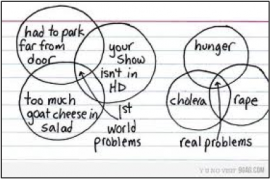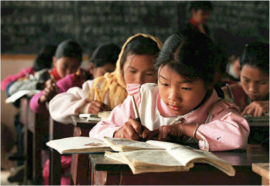I recently heard the phrase “first world problems” to describe 99% of the problems you or any of your friends/family ever have. It’s the kind of stuff I complain about in my everyday life:
* Disappointing music
* Cat poo emergencies as I’m leaving for work
* My TiVo not recording things I tell it to
* Whether or not to make a big deal about my tennis league wins
 These are all first world problems.
These are all first world problems.
They don’t quite compare to the kinds of things that people in the third world deal with every day: avoidable death, disease, war, starvation, ritual gang rape as “punishment.”
It’s that last thing that struck me as I read Half the Sky: Turning Oppression Into Opportunity for Women Worldwide by Nicholas Kristof and Sheryl WuDunn. This book describes almost every possible example of women being abused, humiliated, and mutilated around the world.
This is not an easy book to read. It made me cringe. It put images in my head that I absolutely did not want. In particular, I would be happy to never hear the word “fistula” ever again. When I can’t deal with merely thinking about something that happens every day in real life to real people, it emphasizes what a first world wuss I am.
The appalling thing I learned from the book is how women are so shockingly undervalued in some parts of the world. The treatment, abuse, and downright inhumanity shown towards women and girls baffles me. I would be disgusted if someone treated a dog like that. Even a dog I didn’t like. I just don’t understand how people can be so cruel toward other humans. It is surely a first world problem that I am so confounded by the utter lack of compassion I see in the third world.
Within the cultures where this abuse and neglect takes place, this is not criminal or deviant behavior. It’s an accepted moral code, an extreme view of punishment and justice, that entire villages are complicit in. As a friend of mine replied when I told him about this, in some parts of the world, “it takes a village to rape a child.”
 The book isn’t all about doom and gloom, however. There are some redemptive stories and inspirational successes. The one thing that seems to make all the difference– the easiest way to make the world an infinitely better place– is education for girls. The longer a girl stays in school, the less likely she is to be abused (or to tolerate abuse when it happens), the older she is when she gets married, the better medical care she’ll receive, the more she can earn money and contribute to the economy, and the less children she will have.
The book isn’t all about doom and gloom, however. There are some redemptive stories and inspirational successes. The one thing that seems to make all the difference– the easiest way to make the world an infinitely better place– is education for girls. The longer a girl stays in school, the less likely she is to be abused (or to tolerate abuse when it happens), the older she is when she gets married, the better medical care she’ll receive, the more she can earn money and contribute to the economy, and the less children she will have.
Education for girls appears to have a ripple effect on every part of a culture. It helps the economy, it helps individual families, it helps women’s rights. There are even convincing cases that it helps to reduce terrorism.
It is impossible to realize our goals while discriminating against half the human race. As study after study has taught us, there is no tool for development more effective than the empowerment of women. —Kofi Annan, former UN General Secretary
So from now on I’d like to put most of my international aid effort toward supporting the education of girls and women around the world. That seems to be the most significant third world problem, and one that takes precedence over whether I find the right pair of tennis shoes.
If you would like to know how you can get involved in this cause, see the Half The Sky website.








